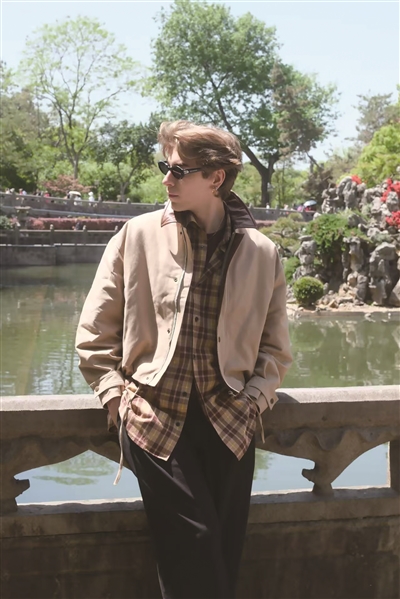
Photo provided to Hangzhoufeel
Story
By Daria Fominykh
When Artem Ansheles arrived in Hangzhou with his crew to film a series of short documentaries, he wasn’t sure what to expect. In fact, he didn’t expect much at all. “I thought it was going to be like a village,” he admitted, laughing. But instead of a sleepy town, he discovered a city buzzing with innovation, abundant green spaces, and surprising kindness from strangers.
Born in Russia’s Kamchatka region and raised in Cyprus, Ansheles has spent most of his adult life in Hong Kong. His multicultural background is reflected in his work--he is an actor, a TV host, a musician, and a fashion influencer. Fluent in Russian, English, Cantonese, Greek, and now learning Mandarin, he fits right in with fast-paced global cities. But Hangzhou still managed to surprise him.
Unexpected impressions
It wasn’t the mix of skyscrapers and green mountains that impressed Ansheles--he had seen that contrast before in Hong Kong. What truly stood out to him in Hangzhou was something far more subtle: the air. “It smells so good,” he kept repeating to his crew as they walked around the city. “The air is so fresh.” For someone who has lived in one of the busiest cities in the world, it was a refreshing change--literally.
He also didn’t expect how developed and modern Hangzhou would be. “I didn’t know much about this place,” he admitted. “When people talk about China, they usually mention Shanghai or Beijing. But Hangzhou? I’d never heard of it.” That quickly changed as he began exploring.
A new kind of drama
On the first day of filming, Ansheles visited a production house for mini-dramas--short videos that resemble TV episodes but are shot vertically and tailored for mobile viewing. The studio, Linying Studio (临影厂) in Hangzhou’s Linping district, is the largest professional soundstage in East China.
“It was a huge building with a lot of different sets,” Ansheles recalled. “They had a metro set, a hospital set, a lab, a police station, residential interiors--so many different locations. And they move from one set to another so quickly. From the outside, it just looks like a regular drama shoot.”
“They shoot more than a hundred 12-minute episodes in just four days,” he added. For someone with years of experience in traditional television production, this fast-paced format was eye-opening. “It’s not just fast--it’s smart. You have to hook the audience in one or two minutes, and viewers actually pay to keep watching.”
Live-streaming and local
Another highlight of the upcoming documentary is an episode capturing a visit to a live e-commerce company--a hub where influencers livestream for hours, trying on clothes, sampling products, and interacting with audiences in real time. “It’s like QVC, but completely modernized,” said Ansheles. He even had a short training session with one of the streamers and tried selling Hangzhou’s local tea on camera. “It wasn’t good enough to publish,” he joked, “but it was fun to try.”
What impressed him most was the use of AI not just behind the scenes, but live during the streams. “It tells the influencer when the audience is losing interest, or when it’s a good moment to introduce a new product. That’s wild.”
From Alipay to AI
The last stop was Zhonghao Xinying (中昊芯英), a chip design firm working on artificial intelligence, one of the most advanced in the country. “Chips aren’t new,” he said, “but chips made specifically for AI--now that’s new and exciting.” Learning that these innovations were coming from Hangzhou was a revelation. “By the way, I didn’t know Alipay and DeepSeek were from here too. It’s like everything is happening here, and I had no idea.”
Ansheles also uses AI in his own work--from asking it “stupid questions” to analyzing his social media data to generate content ideas. “I’m good at creativity,” he said. “But not numbers. So I let the AI help me figure out what performs best.”
Cities learning from each other
Reflecting on the differences between Hangzhou and Hong Kong, Ansheles sees opportunities for both cities to learn from each other. “Hangzhou is remarkably efficient. The way they integrate tech into daily life--especially things like deliveries and payments--is something Hong Kong could learn from.”
And what could Hangzhou adopt from Hong Kong? I suggested it might be food culture, and Ansheles agreed. “In Hong Kong, we have a wide variety of foods from different places. It’s not just Chinese food, it’s lots of Italian and French restaurants--lots of fusion in there,” he explained.
Coming back for the culture
Though this trip focused on innovation, Ansheles promised to return to Hangzhou to dive deeper into its cultural side. He didn’t have time to visit West Lake yet--not to mention the two other UNESCO-listed sites--but they’re now on his list. “Next time, I’ll come back not for work, but just to be a proper tourist.”